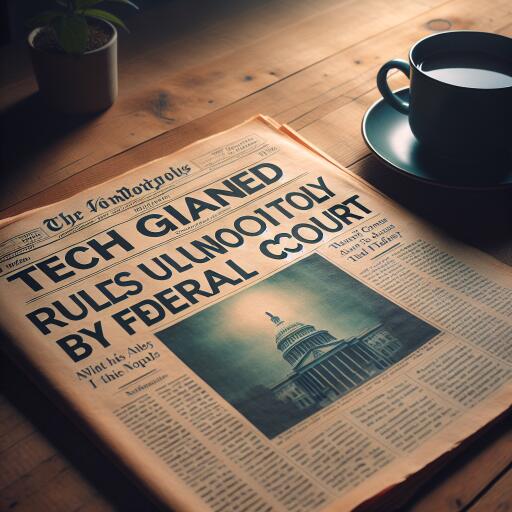Historic Court Decision: Google’s Market Power Curbed by Federal Ruling
In an unprecedented move that marks a significant shift in the landscape of the tech industry, a federal court has ruled that Google’s domination of the internet search market constitutes an illegal monopoly. This landmark decision represents a pivotal moment for the future of digital competition and could have far-reaching implications for the tech giant’s operations.
The ruling, delivered by Judge Amit P. Mehta, declared that Google, owned by Alphabet Inc., has been unlawfully leveraging its market dominance to stifle competition. According to Judge Mehta, Google has breached the Sherman Antitrust Act’s Section 2 by using exclusive arrangements with various companies to ensure its search engine and general text advertising services retain monopolistic control in the market. Such practices, the court found, have effectively quashed the potential for competition, keeping Google firmly at the top of the digital ecosystem.
This case, emblematic of the increasing scrutiny on the power wielded by tech behemoths, was part of a broader initiative by federal prosecutors to challenge the unchecked expansion of Big Tech companies. These efforts underscore a growing concern among antitrust authorities over the concentration of power in the hands of a few and its implications for market fairness and consumer choice. Indeed, similar litigation efforts are underway against other major players in the industry, including Amazon, Meta (formerly Facebook), and Apple, signaling a new era of regulatory intervention in the tech sector.
The Justice Department’s accusations against Google centered around the company’s contractual tactics, notably its requirements for Google to be pre-set as the default search engine on Android devices. This, the government argued, created an unfair playing field, obstructing rivals from competing effectively. Google, on the other hand, maintained that users have the autonomy to change their default search settings—a point that evidently did not sway the court’s decision.
The case, titled U.S. et al v. Google, was initiated in 2020 and has been closely followed by legal and tech industry observers alike. After weeks of testimony, including inputs from high-ranking executives across the tech world, the trial focused solely on the allegations of antitrust violations. The future phase of the legal proceedings will concentrate on identifying appropriate remedies to ensure a competitive search market landscape.
Awaiting Google is another legal battle concerning its advertising technology practices, which is set to unfold in a Virginia federal court. Moreover, Google’s antitrust challenges are not confined to the United States. In Europe, regulators have also launched investigations into the company’s market behavior under the new Digital Markets Act, designed to curb the monopolistic tendencies of internet giants.
This ruling is a watershed moment in the struggle to balance innovation and competition in the digital age. It underscores the complexities of regulating global tech companies whose services are deeply integrated into the fabric of everyday life. As the legal and regulatory landscapes continue to evolve, the tech industry may be standing at the cusp of a new order—one in which the giants may have to play by a different set of rules.









